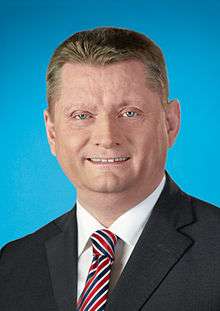Hermann Gröhe
| Hermann Gröhe | |
|---|---|
 | |
| Federal Minister of Health | |
|
Assumed office 2013 | |
| Preceded by | Daniel Bahr |
| Minister of State at the Federal Chancellery | |
|
In office 2008–2009 | |
| Preceded by | Hildegard Müller |
| Succeeded by | Eckart von Klaeden |
| Member of the Bundestag | |
|
Assumed office 1994 | |
| Personal details | |
| Born |
February 25, 1961 Uedem, North Rhine-Westphalia, West Germany (now Germany) |
| Nationality | German |
| Political party | CDU |
| Alma mater | University of Cologne |
Hermann Gröhe (born 25 February 1961) is a German politician for the Christian Democratic Union (CDU). Minister of Health in the third cabinet of Chancellor Angela Merkel which took office 17 December 2013.
Early life and career
Gröhe finished law school at the University of Cologne and was a research assistant at the university 1987-1993. He also worked as a trainee lawyer at a local court in Cologne 1991-1993. He has been a licensed lawyer since 1997.[1]
Political career
Becoming a member of CDU in 1977, Gröhe has represented the party in the German Bundestag since 1994 and has represented the Neuss I constituency since 1995. In the negotiations to form a coalition government following the 2009 federal elections, he was a member of the working group on economic affairs and energy, led by Karl-Theodor zu Guttenberg and Rainer Brüderle.
As successor of Ronald Pofalla, Gröhe was secretary general of the CDU 2009-2013;[1] serving as the campaign manager in the German federal election, 2013.[2] He was credited with marshalling Angela Merkel’s electoral victory that year, the party’s best result since German reunification in 1990.[3] In the negotiations to form a coalition government following the elections, Gröhe was part of the 15-member leadership circle chaired by Merkel, Horst Seehofer and Sigmar Gabriel.
Federal Minister of Health, 2013-present
Following the formation of the third cabinet of Chancellor Angela Merkel, Gröhe took office as Federal Minister of Health. His deputies are Ingrid Fischbach and Annette Widmann-Mauz.
In October 2014, Gröhe's elderly care reform bill, which is supposed to better fit the individual needs of those in care and expected to cost the government a further 1.2 billion euro ($1.5 billion), was passed by the Bundestag.[4]
In December 2014, Gröhe was surprisingly contested by Jens Spahn for a place on the CDU’s ruling council, in a move that was widely seen as crystallizing the generational tensions within the party. Spahn’s election bid was backed by the then 72-year-old finance minister, Wolfgang Schäuble.[5] Shortly before the vote at the annual CDU party conference, Gröhe withdrew his candidacy and Spahn was elected.[6]
During his time in office, Gröhe also focused heavily on global health issues. Alongside his colleague Gerd Müller, he travelled to Ghana and Liberia right after the West African Ebola virus epidemic in 2015.[7] That same year, he accompanied Merkel when she spoke at the opening of the annual World Health Assembly in Geneva on the need for reforming the World Health Organization (WHO) to ensure there is prompt response to health emergencies.[8] As part of Germany's G7 presidency in 2015, he brought together G7 Health Ministers to adopt a declaration addressing antimicrobial resistance (AMR).
In March 2016, Gröhe was appointed by United Nations Secretary-General Ban Ki-moon to the High-Level Commission on Health Employment and Economic Growth, which was co-chaired by presidents François Hollande of France and Jacob Zuma of South Africa.[9] He later led Germany's delegation to the 2016 High Level Meeting on Ending AIDS in New York.
Other activities
- German Forum for Crime Prevention (DFK), Ex-Officio Member of the Board of Trustees[10]
- Chrismon, Co-editor (2000-2009)
- Evangelical Church in Germany (EKD), Member of the Council (1997-2009)
- German Institute for Human Rights (DIMR), Member of the Board of Trustees (2001-)
- Konrad Adenauer Foundation (KAS), Member of the Board (since 2001)
- ZDF, Member of the Television Board
Personal life
Gröhe is married with Heidi Oldenkott-Gröhe; they have four children. He is a Protestant.[1]
References
- 1 2 3 http://www.hermann-groehe.de/page/57.htm Hermann-grohe.de. Retrieved 16 December 2013. Archived at WebCite.
- ↑ Introducing the new German cabinet: Party loyalist Deutsche Welle. Retrieved 16 December 2013
- ↑ Patrick Donahue (December 15, 2013), German Chancellor Merkel’s Third-Term Cabinet: List of Ministers Bloomberg News.
- ↑ Elizabeth Schumacher (October 17, 2014), Germany passes elderly care reform despite opposition's criticism Deutsche Welle.
- ↑ Stefan Wagstyl (December 7, 2014), Political upstart challenges Germany’s greying leaders Financial Times.
- ↑ Stefan Wagstyl (December 9, 2014), Merkel eyes relief for German taxpayers Financial Times.
- ↑ Daniel Tost (April 8, 2015), German ministers visit West Africa with ‘lessons from Ebola’ EurActiv.
- ↑ Sarah Boseley (May 18, 2015), Plan to reform WHO after Ebola to be unveiled by Angela Merkel The Guardian.
- ↑ High-Level Commission on Health Employment and Economic Growth – Commissioners World Health Organization.
- ↑ Board of Trustees German Forum for Crime Prevention (DFK).
| Wikimedia Commons has media related to Hermann Gröhe. |